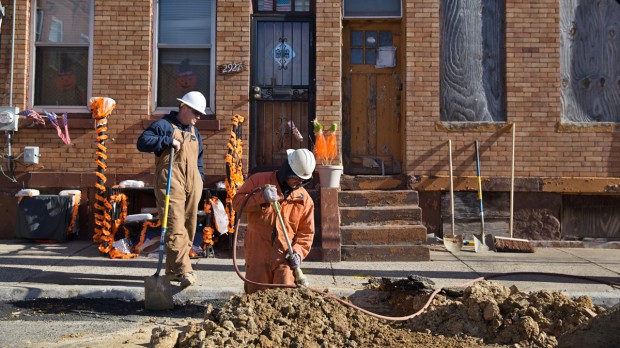PUC gives Philadelphia utility green light on raising fee to replace leaky gas mains
-
Katie Colaneri

Lindsay Lazarski/WHYY
Kevin McDonald, PGW Senior Pipe Mechanic uses a compressor to back fill soil covering main and service pipelines in North Philadelphia.
Philadelphia Gas Works customers will soon be paying a little bit extra to help speed up replacement of the utility’s old, leaky gas mains.
The Pennsylvania Public Utility Commission has given PGW the green light to raise its customer infrastructure surcharge by 2.5 percent. For the average consumer, that means paying about $1.65 more on their monthly gas bill. For the utility, spokesman Barry O’Sullivan said it means cutting the time it will take to replace less than 1,500 miles of old gas mains down from 88 years to 48 years.
“So in one stroke of the pen or in one considered ruling, we’ve been able to take 40 years off a length of time we anticipate it will take to replace the older elements of PGW’s infrastructure across Philadelphia,” O’Sullivan said.
PGW applied to raise the surcharge, known as the Distribution System Improvement Charge or DISC, in September. It was one of seven options laid out several months earlier by the PUC, which oversees the utility’s rates and has been pressuring PGW to ramp up its pipe-replacement program.
“It is clear from the record that PGW requires additional funds to more rapidly replace its aging pipe. With that said, I am also keenly aware of the additional burdens this places on the ratepayers of PGW,” said PUC vice chairman Andrew Place in a statement. “Therefore, I also strongly suggest that PGW work closely with Commission staff to look for additional, internally generated funds to supplement these [distribution system improvement charge] revenues for the purposes of further acceleration of their pipeline replacement investments.”
As StateImpact Pennsylvania has reported, about one-quarter of PGW’s gas mains are made of cast-iron and bare steel. Many were laid beneath the city streets more than a century ago in the late 1800s. Those old pipes tend to leak, which can lead to dangerous explosions and contribute to greenhouse gas emissions. PGW reported 7,600 leaks in 2014, up from 6,200 in 2013, and the number of hazardous leaks also rose to 3,448 that year from 3,122 in 2013.
PGW has been replacing them with more modern plastic pipes, but the pace has been slow because the cost is so high at roughly $1 million per mile.
The PUC has been leaning on PGW to replace its infrastructure at a faster rate since the failed sale of the city-owned utility to Connecticut-based UIL Holdings in late 2014.
















